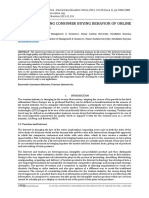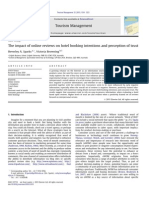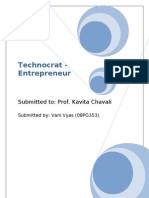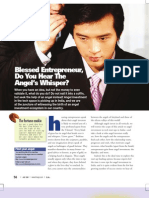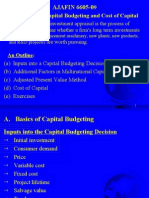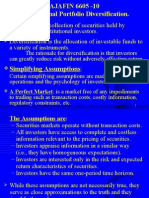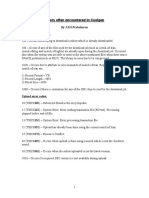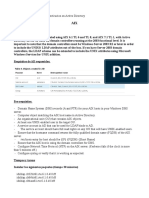Success of Travel Agencies
Success of Travel Agencies
Uploaded by
Gaurav KumarCopyright:
Available Formats
Success of Travel Agencies
Success of Travel Agencies
Uploaded by
Gaurav KumarOriginal Title
Copyright
Available Formats
Share this document
Did you find this document useful?
Is this content inappropriate?
Copyright:
Available Formats
Success of Travel Agencies
Success of Travel Agencies
Uploaded by
Gaurav KumarCopyright:
Available Formats
Consumers can now access online bookings for airlines, accommodation, transportation, sightseeing
tours and other related products, so why do they still go to travel agencies for reservations?
Survey results revealed that there were 12 significant attributes impacting on consumer selection
and, of these, the most important were the knowledge and experience of consultants, and the
helpfulness and friendliness of consultants. Travel reward programs were seen as the least influential
in this research.
The literature suggested that additional services (such as visa handling and travel insurance) have
been advertised as one of the key factors that differentiate one travel agency from another (Persia &
Gitelson, 1993). This attribute was important, particularly in the travel agency business, since it is a
common belief that customers from a competitor can be won over if an attractive list of free 'extras' is
offered (Persia & Gitelson, 1993). Agency advertisement, knowledgeable and experienced travel
consultants, and sufficient brochures were important to consumers where they could consider the
use of such information, opinions and suggestions provided to evaluate alternatives prior to making
the purchase
The findings in several studies conducted (for example, Kendall & Booms, 1989; Meidan, 1979)
revealed that the physical aspects of agency (i.e., agency layout and atmosphere, convenient location
and trading hours/days) were regarded as a fundamental concern of travel agency users.
Finally, in the service-oriented travel agency business, helpful and friendly staff could be central to
the success of the transaction where integrating consumers' participation becomes part of the
process of delivering the outcome
The use of online search facilities for travel information has provided additional sources of
information and opportunities to purchase travel direct from suppliers, such as airlines and
accommodation providers, without recourse to travel agents (Buhalis, 1998). In some instances, such
purchases can be made at discounts to prices available through travel agencies by eliminating
commissions for such agents (example such as the Flight Centre). Furthermore, the capacity of the
internet to promote and provide information very conveniently and quickly has provided alternatives
to physical visits by consumers to travel agencies in order to access such information (Buhalis, 1998).
Travel research consistently shows the importance of word-of-mouth (WOM) information
sources in the travel decision-making process. Friends and relatives have been identified as
organic image-formation agents, and it has been emphasized that this WOM information is one
of the most relied-upon sources of information for destination selection. While there has been
recognition of the importance of WOM information sources on consumer behaviour in tourism,
little has been performed to understand more specifically how and what behaviour is influenced
Forget the advice of travel agents. Now the tourist experience is shaped and
motivated by consumer-generated media such as YouTube and Flickr. At least that’s
what the School of Tourism and Hospitality Management’s National Laboratory for
Tourism and Ecommerce (NLTeC) discovered. NLTeC conducted a series of studies
that explored how consumer-generated media such as blogs, wikis and image- and
video-sharing websites influence the process of information searching and
experience sharing for tourists. Based on our studies, 70 percent of travelers are
using the internet for travel-related purposes, either booking flights and hotels or
searching for information,” said Dan Fesenmaier, director of NLTeC. “Because
consumer-generated media is changing the way people search for tourism
information and communicate with others, it is essential to study.”
“Tourists’ comments on personal travel videos build a community where people can
share information with each other,” Ultimately, such videos provided virtual access.
Word
Of
Mouth
Online travel Travel Agents
services
‘Relationship
‘Viral Marketing’ Marketing’
You might also like
- MXQ 4K Android TV Box ManualDocument21 pagesMXQ 4K Android TV Box ManualSwaroop RaoNo ratings yet
- Destination Brand Authenticity What An Experiential Simulacrum! ADocument19 pagesDestination Brand Authenticity What An Experiential Simulacrum! AshanmuNo ratings yet
- Zero Ink PrintingDocument3 pagesZero Ink PrintingGaurav KumarNo ratings yet
- E Tourism EncyclopediaDocument8 pagesE Tourism EncyclopediawissamNo ratings yet
- e Tourism EncyclopediaDocument8 pagese Tourism Encyclopediaman647404No ratings yet
- Lsme411 Assignment1 (Raisa)Document5 pagesLsme411 Assignment1 (Raisa)researchhubpersonalNo ratings yet
- Online Travel Agent and Airlines (2007)Document13 pagesOnline Travel Agent and Airlines (2007)WiraNo ratings yet
- E-Tourism EncyclopediaDocument8 pagesE-Tourism Encyclopediaakshay77a77No ratings yet
- Analyzing Consumer Cost Efficiency: A Quantitative Study of Travel Agency Bookings in Cabanatuan CityDocument17 pagesAnalyzing Consumer Cost Efficiency: A Quantitative Study of Travel Agency Bookings in Cabanatuan CityPoonam KilaniyaNo ratings yet
- E Tourism EncyclopediaDocument8 pagesE Tourism EncyclopediaJohn DiazNo ratings yet
- Online Travel Portal and Their Effect On Travel Agency: A Study On Outbound Visitors of VaranasiDocument7 pagesOnline Travel Portal and Their Effect On Travel Agency: A Study On Outbound Visitors of VaranasigajendraNo ratings yet
- The Impact of Social Media Influencers On Travel Decisions The Role of Trust in Consumer Decision JourneyDocument22 pagesThe Impact of Social Media Influencers On Travel Decisions The Role of Trust in Consumer Decision JourneyBeatriz BiscaiaNo ratings yet
- Tourism Project Management - HAN18080098Document28 pagesTourism Project Management - HAN18080098Hienn AnhhNo ratings yet
- TOUR 85 Act 2Document1 pageTOUR 85 Act 2Ailen AlbueroNo ratings yet
- CHAPTER 2 Literature Review SamerrDocument18 pagesCHAPTER 2 Literature Review SamerrMashaal FNo ratings yet
- Use & Impacts of Travel ReviewDocument12 pagesUse & Impacts of Travel ReviewHa Le HiepNo ratings yet
- The Influence of Travelers SatisfactionDocument5 pagesThe Influence of Travelers Satisfactionpz4zthgh4nNo ratings yet
- Factors Affecting Travel Decision Making: A Study of The Credibility of Online Travel-Related Information in VietnamDocument10 pagesFactors Affecting Travel Decision Making: A Study of The Credibility of Online Travel-Related Information in VietnamAnh Trần QuỳnhNo ratings yet
- DownloadDocument12 pagesDownloadAdrian van HandsNo ratings yet
- Travel Agency Tour Operations MGT 3Document35 pagesTravel Agency Tour Operations MGT 3raillegue100% (1)
- Social Media Network ContributionDocument19 pagesSocial Media Network ContributionMae EvangelistaNo ratings yet
- Blogger Reference 6Document25 pagesBlogger Reference 6aronara dalampasiganNo ratings yet
- 2.0 Chapter 2 - Literature ReviewDocument7 pages2.0 Chapter 2 - Literature ReviewIvan JozefNo ratings yet
- Journal of Destination Marketing & Management: Jaume Marin, Adriana Figueroa, Lluís MundetDocument13 pagesJournal of Destination Marketing & Management: Jaume Marin, Adriana Figueroa, Lluís MundetCymon AriolaNo ratings yet
- Article 10Document7 pagesArticle 10Sdiri MongiaNo ratings yet
- Impact of E-Commerce On Travel AgenciesDocument11 pagesImpact of E-Commerce On Travel AgenciesKatherine AquijeNo ratings yet
- Introduction RearrangeDocument3 pagesIntroduction Rearrangeanngelyn legardaNo ratings yet
- Travel BlogsDocument20 pagesTravel BlogsShivani MittalNo ratings yet
- Heliyon: Kassegn Berhanu, Sahil RajDocument10 pagesHeliyon: Kassegn Berhanu, Sahil RajCymon AriolaNo ratings yet
- Individual Report 2Document4 pagesIndividual Report 2Shahrukh GhaffarNo ratings yet
- The Tourism Industry and Information TechnologyDocument4 pagesThe Tourism Industry and Information TechnologyLove DarleneNo ratings yet
- A Recommender System Based On PersonalDocument15 pagesA Recommender System Based On Personalreiko-sanNo ratings yet
- Tourist Destination Choice and Social Media: Amina MerabetDocument8 pagesTourist Destination Choice and Social Media: Amina MerabetaijbmNo ratings yet
- Intern Report On Travel AgencyDocument50 pagesIntern Report On Travel AgencyMd. Mamun Hasan BiddutNo ratings yet
- Outcome 2Document12 pagesOutcome 2Nicole SolisNo ratings yet
- Traditional Travel Agencies Are Not Beaten by E-Commerce: The Case of Bosnia and HerzegovinaDocument10 pagesTraditional Travel Agencies Are Not Beaten by E-Commerce: The Case of Bosnia and Herzegovinaadnan_pripiNo ratings yet
- Tourism Management: Tiago Oliveira, Benedita Araujo, Carlos TamDocument14 pagesTourism Management: Tiago Oliveira, Benedita Araujo, Carlos Tamnemerw129No ratings yet
- The Tourism Industry and The Use of InternetDocument4 pagesThe Tourism Industry and The Use of Internetraysubha123No ratings yet
- The Impact of Electronic Word of Mouth On TouristsDocument17 pagesThe Impact of Electronic Word of Mouth On TouristslinhtlnNo ratings yet
- Destination Decision-Making ProcessDocument18 pagesDestination Decision-Making ProcessthyolasNo ratings yet
- Chapter 2Document12 pagesChapter 2alyssadacasin462No ratings yet
- Literature Review TourismDocument7 pagesLiterature Review Tourismea6p1e99100% (1)
- Cox2011-Consumer Generated Media in Hospitality and Tourism Travellers Likes and Their Concerns About The Latest Innovat PDFDocument10 pagesCox2011-Consumer Generated Media in Hospitality and Tourism Travellers Likes and Their Concerns About The Latest Innovat PDFdanikapanNo ratings yet
- Factors Affecting Consumer Buying Behavior of Online Travel AgenciesDocument11 pagesFactors Affecting Consumer Buying Behavior of Online Travel AgenciesBea RomeroNo ratings yet
- JTR 2522Document14 pagesJTR 2522Levi PNo ratings yet
- 10.25019 Mdke 7.1.05Document18 pages10.25019 Mdke 7.1.05Gina Levinna L.No ratings yet
- Tourist Behaviors in Online Booking:: A New Research AgendaDocument6 pagesTourist Behaviors in Online Booking:: A New Research AgendaArief KwokNo ratings yet
- Sec EtourismDocument10 pagesSec EtourismReyan BishtNo ratings yet
- Follow Us On Instagram - Understanding The Driving Force Behind Following Travel Accounts On Instagram.Document18 pagesFollow Us On Instagram - Understanding The Driving Force Behind Following Travel Accounts On Instagram.oya.strategytechNo ratings yet
- Travel Blogs and The Implications For Destination MarketingDocument11 pagesTravel Blogs and The Implications For Destination MarketingKarabi ShapnilNo ratings yet
- (Thesis Source) Travelers' Use of Social Media - A Clustering ApproachDocument15 pages(Thesis Source) Travelers' Use of Social Media - A Clustering ApproachPhạm Gia ĐạtNo ratings yet
- The Impact of Online Reviews On HotelDocument14 pagesThe Impact of Online Reviews On Hoteleb060765No ratings yet
- Sustainability 12 04770Document18 pagesSustainability 12 04770Lê Phương ThảoNo ratings yet
- Sdoc 09 10 SiDocument6 pagesSdoc 09 10 Side-angel.manyikaNo ratings yet
- CHAP123 - RevisedDocument21 pagesCHAP123 - RevisedjemardyaneNo ratings yet
- 1 s2.0 S1447677023000876 MainDocument9 pages1 s2.0 S1447677023000876 Mainamandamlp22No ratings yet
- winning-the-battle-the-importance-of-price-and-online-idc9adl8v8 ARTICLE 51Document26 pageswinning-the-battle-the-importance-of-price-and-online-idc9adl8v8 ARTICLE 51laurette.assalleNo ratings yet
- Paper On Impact of Social Media On Tourism IndustryDocument12 pagesPaper On Impact of Social Media On Tourism IndustryNandini Singh100% (1)
- WOM Research PaperDocument6 pagesWOM Research PaperBakrie AkhmadNo ratings yet
- Research ProposalDocument16 pagesResearch Proposalandizane216No ratings yet
- BEHAVIOURAL INFLUENCE OF SELF-SERVICE TECHNOLOGY IN MANAGING INTERFACE IN THE AVIATION INDUSTRYFrom EverandBEHAVIOURAL INFLUENCE OF SELF-SERVICE TECHNOLOGY IN MANAGING INTERFACE IN THE AVIATION INDUSTRYNo ratings yet
- Xylo Vs Innova Comparison - High EndDocument5 pagesXylo Vs Innova Comparison - High EndGaurav KumarNo ratings yet
- Stealth TechnologyDocument6 pagesStealth TechnologyGaurav KumarNo ratings yet
- Micro Financing & Micro BorrowersDocument22 pagesMicro Financing & Micro BorrowersGaurav KumarNo ratings yet
- Financial Derivatives & Risk ManagementDocument24 pagesFinancial Derivatives & Risk ManagementGaurav Kumar0% (1)
- Management of Financial DerivativesDocument35 pagesManagement of Financial DerivativesGaurav Kumar100% (1)
- CREDIT RATING OF MSMEsDocument16 pagesCREDIT RATING OF MSMEsGaurav KumarNo ratings yet
- Genepax - Water Powered CarDocument2 pagesGenepax - Water Powered CarGaurav Kumar100% (1)
- SME FinancingDocument9 pagesSME FinancingGaurav KumarNo ratings yet
- Credit Gap For Small Scale IndustriesDocument12 pagesCredit Gap For Small Scale IndustriesGaurav KumarNo ratings yet
- Impact of Credit Rating On MsmeDocument11 pagesImpact of Credit Rating On MsmeGaurav KumarNo ratings yet
- Small and Medium EnterprisesDocument9 pagesSmall and Medium EnterprisesGaurav KumarNo ratings yet
- Micro Small and Medium EnterprisesDocument12 pagesMicro Small and Medium EnterprisesGaurav KumarNo ratings yet
- Technocrat - EntrepreneurDocument4 pagesTechnocrat - EntrepreneurGaurav Kumar100% (1)
- Business Ethics: Suppliers As StakeholdersDocument8 pagesBusiness Ethics: Suppliers As StakeholdersGaurav KumarNo ratings yet
- Blessed Entrepreneur, Do You Hear The Angel's Whisper?Document9 pagesBlessed Entrepreneur, Do You Hear The Angel's Whisper?Gaurav KumarNo ratings yet
- Micro Borrowing: Smes - Role of MfisDocument16 pagesMicro Borrowing: Smes - Role of MfisGaurav KumarNo ratings yet
- Success Story PDFDocument56 pagesSuccess Story PDFhemantmNo ratings yet
- Financial Planning & Tax Management - Section - 115-O of The Indian Income Tax Act, 1961Document8 pagesFinancial Planning & Tax Management - Section - 115-O of The Indian Income Tax Act, 1961Gaurav KumarNo ratings yet
- Credit Gap For Small Scale IndustriesDocument52 pagesCredit Gap For Small Scale IndustriesGaurav KumarNo ratings yet
- Indian EntrepreneurshipDocument10 pagesIndian EntrepreneurshipGaurav KumarNo ratings yet
- International Financial MarketsDocument92 pagesInternational Financial MarketsGaurav Kumar100% (1)
- Special Provisions Regarding Assessment of FirmDocument5 pagesSpecial Provisions Regarding Assessment of FirmGaurav KumarNo ratings yet
- Global Top Ten 2007-08Document19 pagesGlobal Top Ten 2007-08Gaurav Kumar100% (1)
- International Capital Budgeting and Cost of CapitalDocument50 pagesInternational Capital Budgeting and Cost of CapitalGaurav Kumar100% (2)
- Bop & International Economics LinkagesDocument77 pagesBop & International Economics LinkagesGaurav Kumar100% (2)
- Introduction To International Finance: Scope and FeaturesDocument33 pagesIntroduction To International Finance: Scope and FeaturesGaurav Kumar89% (19)
- International Portfolio DiversificationDocument34 pagesInternational Portfolio DiversificationGaurav Kumar100% (1)
- International Portfolio ManagementDocument9 pagesInternational Portfolio ManagementGaurav KumarNo ratings yet
- Parity Conditions in International FinanceDocument68 pagesParity Conditions in International FinanceGaurav Kumar100% (2)
- Why Service Stinks PDFDocument9 pagesWhy Service Stinks PDFUtkarsh SinghalNo ratings yet
- Big Book of Digital MarketingDocument130 pagesBig Book of Digital Marketingblackweb00No ratings yet
- 800-70387-001 - 7782 AP Install Guide RevB - 20121210Document84 pages800-70387-001 - 7782 AP Install Guide RevB - 20121210ytrffgNo ratings yet
- ArcSight Product Brief LoggerDocument3 pagesArcSight Product Brief Loggernduc_181273No ratings yet
- COPA2 Ndsem TPDocument303 pagesCOPA2 Ndsem TPshalukutty343No ratings yet
- Numerology - Best Dates To MarryDocument10 pagesNumerology - Best Dates To MarrycrespoNo ratings yet
- 2 - 3 E-Communications (CAT Grade 12)Document36 pages2 - 3 E-Communications (CAT Grade 12)KynG Beat[s] ZANo ratings yet
- RTI Online - View Status FormDocument1 pageRTI Online - View Status FormrajusyNo ratings yet
- Peru Telecom Operators Country Intelligence ReportDocument4 pagesPeru Telecom Operators Country Intelligence Reportphuonganh.hrworkNo ratings yet
- Street Cop To CIODocument10 pagesStreet Cop To CIOcemararengganisNo ratings yet
- DHINVR608H64XI Download 1 15 29 30Document4 pagesDHINVR608H64XI Download 1 15 29 30cemapa4131No ratings yet
- Errors Often Encountered in CoolgenDocument8 pagesErrors Often Encountered in CoolgenPrabakaran JeyachnadranNo ratings yet
- Network DiagramDocument33 pagesNetwork DiagramRanjana Priya100% (1)
- OPC and CORBA in MESDocument8 pagesOPC and CORBA in MESPaulo Marcelo P. A. BlancoNo ratings yet
- 40-Gbs 0.7-V 21 MUX and 12 DEMUX With Transformer-Coupled Technique For SerDes InterfaceDocument6 pages40-Gbs 0.7-V 21 MUX and 12 DEMUX With Transformer-Coupled Technique For SerDes InterfaceshaliniNo ratings yet
- En Manual: AuthorDocument86 pagesEn Manual: AuthormohhizbarNo ratings yet
- Erppmc and Apms - Test CasesDocument111 pagesErppmc and Apms - Test Cases452bob80% (10)
- Research ChurbanesDocument6 pagesResearch ChurbanesAmore SoloNo ratings yet
- CXDI Quick Reference GuideDocument12 pagesCXDI Quick Reference GuideLuis Fernando Garcia SNo ratings yet
- AIX - AD Integracion With Ldap and KerberosDocument8 pagesAIX - AD Integracion With Ldap and KerberosvictorsinaNo ratings yet
- EXFO 100G Testing Guide PDFDocument104 pagesEXFO 100G Testing Guide PDFJunaidNo ratings yet
- Spring MVC Basics: Key InterfacesDocument8 pagesSpring MVC Basics: Key InterfacesSrinivasan MaharajanNo ratings yet
- AWS IAM NotesDocument12 pagesAWS IAM NotessivakumarNo ratings yet
- Unit 1 - Basics of Cyber SecurityDocument19 pagesUnit 1 - Basics of Cyber SecurityVarun pNo ratings yet
- Simatic HMI Remote AccessDocument7 pagesSimatic HMI Remote AccessAbenet BekeleNo ratings yet
- WT EX 1-6 Raju PDFDocument24 pagesWT EX 1-6 Raju PDFRaj NishNo ratings yet
- Vocabluaryunit 9intermediate (Speakout 2nd)Document3 pagesVocabluaryunit 9intermediate (Speakout 2nd)Olga KohnoNo ratings yet
- Difference Between FTP and HTTPDocument2 pagesDifference Between FTP and HTTPEelha Adad AleemanNo ratings yet
- Difference Between Stateless and Stateful ProtocolDocument2 pagesDifference Between Stateless and Stateful ProtocolMsindisi LwenjeNo ratings yet











































